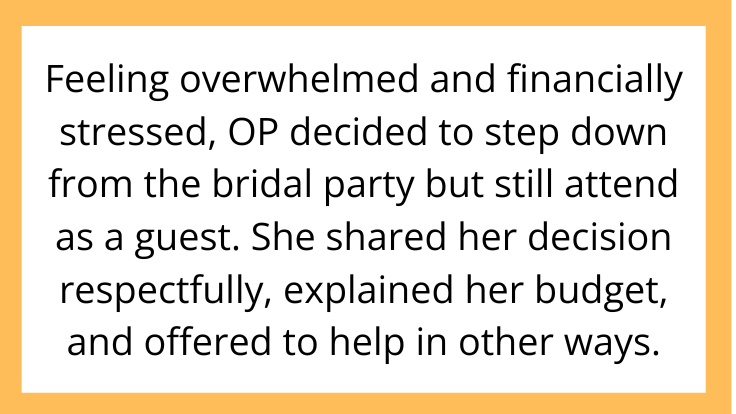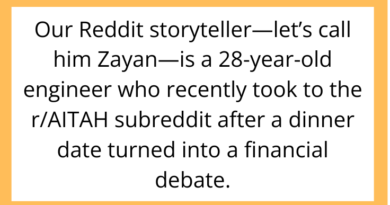AITAH for Refusing to Pay for My Friend’s Wedding After Backing Out as a Bridesmaid?
Weddings are supposed to be joyful, but when money, expectations, and friendships collide, things can turn sour fast. This AITAH story shines a light on what happens when someone tries to set boundaries about finances and time—and ends up being called selfish.
One Reddit user found themselves caught between guilt and practicality after backing out of a bridesmaid commitment. But does stepping away mean you owe someone thousands of dollars? Let’s dig in.
The Situation: Bridesmaid Today, Villain Tomorrow

The Original Poster (OP) explained that they had agreed to be a bridesmaid for a longtime friend. Initially, the wedding was supposed to be a modest affair—simple dresses, an in-town venue, and a few hundred dollars of costs per person.
But as the date got closer, the bride’s plans escalated: designer dresses, a destination venue in Mexico, mandatory spa weekends, and a professional photographer to follow the bridal party. OP calculated that participating would cost over $4,000, not including time off work.
Feeling overwhelmed and financially stressed, OP decided to step down from the bridal party but still attend as a guest. She shared her decision respectfully, explained her budget, and offered to help in other ways.
Instead of understanding, the bride exploded—accusing OP of ruining the wedding and demanding that she pay her “share” of the bridesmaid expenses regardless. Other bridesmaids joined in, calling OP inconsiderate and selfish.
Now OP is asking: Am I the jerk for refusing to pay for costs I didn’t agree to?
Friendship and Money: An Explosive Mix

When the Budget Keeps Growing
One of the biggest reasons friendships fracture around weddings is the creeping cost. What starts as a small commitment can balloon into an expensive, unpaid second job.
OP never agreed to a lavish destination wedding, nor to paying thousands for luxury experiences. Yet the bride treated stepping down as a personal betrayal rather than an honest boundary.
Respecting Limits Is Not Selfish
Many people confuse “helping a friend” with “ignoring your own needs.” But respect goes both ways. Expecting someone to spend money they don’t have—or don’t want to spend—crosses into entitlement.
Reddit users pointed out that declining to be a bridesmaid doesn’t mean you’re declining friendship. It means you’re being realistic about what you can do.
Reddit’s Verdict: Not the Jerk

The AITAH community rallied behind OP:
“You didn’t sign up to fund her dream wedding. You have every right to step away.”
“If she wanted a $4,000 commitment, she should have been upfront from day one.”
“Friendship doesn’t mean draining your savings.”
Consensus was clear: declining to go along with excessive spending does not make you the villain.
Emotional Manipulation: Guilt Tripping Over Boundaries

The Bride’s Reaction Crossed a Line
Instead of accepting OP’s polite, honest explanation, the bride resorted to emotional blackmail—calling OP a bad friend and rallying others to shame her. This tactic isn’t uncommon in wedding culture, where brides are often encouraged to believe that their big day justifies any demand.
But as many commenters pointed out, guilt tripping is a red flag. True friends don’t make each other feel worthless over money.
The Idea of “Owing” Money
The bride’s expectation that OP would pay for expenses after stepping down is particularly unreasonable. OP didn’t order a dress or book the spa packages. If the bride chose to pre-pay for non-refundable items without confirming commitment, that was her responsibility—not OP’s.
Setting Boundaries Without Burning Bridges

Offering Alternatives
OP’s approach was thoughtful—she still planned to attend the wedding as a guest and offered help in other ways. This is an example of compromise, not abandonment.
Boundaries are not ultimatums. They are limits that protect relationships from resentment and burnout.
Accepting the Fallout
While it’s natural to want to avoid conflict, sometimes saying no will end friendships—especially if the other person can’t accept limits. That doesn’t mean you did something wrong.
You’re not obligated to bankrupt yourself to stay friends.
Final Thoughts: You’re Not the Jerk for Prioritizing Your Well-Being

This AITAH story proves that setting boundaries is often mistaken for selfishness. But the reality is, no one should be pressured into financial decisions that make them uncomfortable—or resentful.
If your friendship can’t survive you saying “I can’t afford this,” it was probably never as solid as you hoped.



